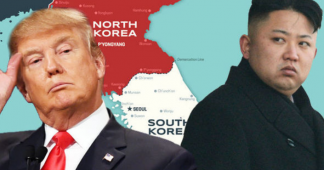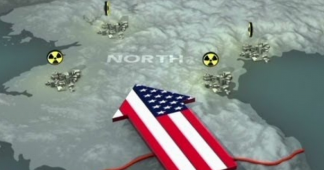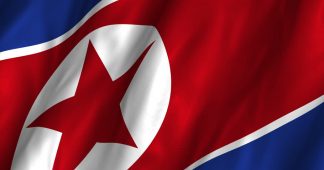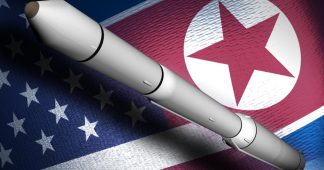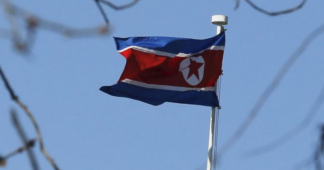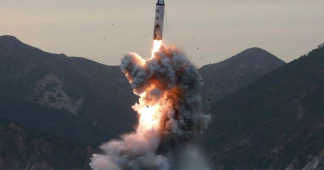By Denny Roy
Accustomed to the privileges of being a superpower, Americans have a low tolerance for insecurity. They cannot abide the notion that the Democratic People’s Republic of Korea (DPRK) government, which Americans generally believe is both irrational and extremely hostile, will soon be able to hit the US homeland with a nuclear missile.
In Hawaii, for example, public anxiety over North Korea recently caused the state government to release guidelines for coping with “nuclear detonation”. The guidelines include handy tips such as the suggestion that drivers pull to the side of the road, and a warning that “electrical, water and other utilities may be severely disrupted or unavailable”. For those old enough to remember the cold war, this is reminiscent of the authorities’ advice to “duck and cover” upon hearing the sirens indicating incoming Soviet missiles.
The rhetoric coming out of both Pyongyang and Washington is disturbing. Increasing the mutual hostility and each side’s worries that the other may be planning to attack can worsen the crisis. Nevertheless, the forces restraining both sides from shooting first are very robust. Both sides have reason to talk tough but act cautiously. Uncharacteristicly for an American president, Trump has recently used rhetoric against North Korea that sounds like Pyongyang’s threats against the United States. But Trump’s “fire and fury” comment was not an accurate statement of US policy. The literal meaning was that the US will respond to North Korean “threats” and “threatening” with a nuclear attack. This was disproved hours later by a new North Korean threat against Guam that produced no mushroom cloud over Pyongyang.
It is reasonable to interpret Trump’s comment as a restatement of a long-held and rather obvious US position, which is that if North Korea were to use a nuclear weapon against the United States or a US ally, Washington would respond with a devastating military attack against the North Korean government, very likely including a nuclear counterstrike. It is necessary for the US to restate this position more clearly and strongly as North Koreans get closer to a nuclear capability, lest they believe their new capability makes them immune to retaliation.
For its part, Pyongyang speaks in stridently bellicose terms as part of a time-honoured strategy of using bravado to compensate for economic and conventional military weakness vis-à-vis the US and South Korea, to extract concessions from them, and to create the impression at home that the Kim regime is heroically protecting the country from war-mongering foreigners. Actually starting a war, however, would be suicidal for the regime. North Korea generally stipulates that its threats are what the DPRK would do in response to a US or South Korean attack. In some cases Pyongyang has issued vague threats that turn out to be bluffs, such as saying it will retaliate against economic sanctions with military force.
North Korea is addicted to missiles – if intervention fails, it’s war
There are three possible ways Washington can attempt to stop North Korea from deploying a workable long-range nuclear missile. The first is diplomacy with Pyongyang. This appears to have reached an impasse because Washington insists negotiations must be about Pyongyang denuclearising, while Pyongyang insists it will never give up its nuclear weapons.
he second avenue is economic coercion against North Korea. Multiple rounds of increasingly tough sanctions have thus far failed to halt the DPRK’s progress toward building a nuclear missile. As North Korea’s most important trading partner by far, China has been the key to an effective campaign of economic pressure, and China’s support for sanctions has been ambivalent. Beijing has consistently criticised the use of economic sanctions in this case, has lobbied the UN Security Council for less stringent sanctions, and has proclaimed a loophole for “humanitarian” considerations.
The third way Washington could interrupt North Korea’s nuclear missile progress would be a preventive surgical military attack against key technical infrastructure inside the DPRK. The benefits of such an attack would be temporary and incomplete, since much of this infrastructure is hidden and dispersed, and the risks would be prohibitive. Kim might retaliate by ordering his forces to fire their artillery and rockets at South Korea’s capital, home to 25 million (including more than 100,000 Americans). Even limited military action by the US could easily escalate into a second Korean war.
With diplomacy stalled, the Trump Administration has apparently decided to implement increased economic pressure rather than military action. This involves more sanctions against North Korea and continued US pestering of China to curtail trade with North Korea, cut off its access to the international financial system, and stop delivering crucial supplies unless Pyongyang agrees in principle to denuclearise. Trump seems willing to reward effective Chinese cooperation on North Korea by delaying anti-China actions in the US-China economic relationship. A major campaign promise of candidate Trump was to correct what he characterised as unfair trade practices by China.
Trump claimed China was “raping” the US economy and threatened to retaliate with startling policies including a 40 per cent tariff on all Chinese imports into the US. The White House delayed punitive economic action expected in early August. Instead, it announced on August 14 an inquiry into China’s IPR practices, but that investigation could take as long as one year. Beijing saw this as a form of pressure over North Korea and criticised Washington for “politicising” the US-China trade relationship.
Beijing said China would stop importing coal, iron ore, lead and seafood from North Korea beginning on August 15. This makes it easier for Washington to give sanctions another chance and shelve the idea of preventive military action. It is likely, however, that in the coming months North Korean missile tests will continue, demonstrating that once again sanctions have not prevented Pyongyang from making additional progress toward deploying a nuclear missile. If this happens, the crisis will spike again – probably higher than ever before because of the realisation that the window of prevention is nearly shut.
Recent Chinese policy has included the following elements: (1) applying limited pressure on the Kim regime, but avoiding the danger of causing a collapse; (2) deflecting American claims that China has the power and responsibility to change Pyongyang’s behaviour; (3) urging a peaceful process towards denuclearisation; and (4) demanding that Seoul not embed itself more deeply in a US-led anti-missile system. This policy, however, is becoming unsustainable. Clearly, limited pressure is not enough to force Pyongyang to denuclearise. The pressure must be strong enough that there would be some risk to the regime’s survival. US leaders don’t buy Chinese protestations of impotence. They know China supplies North Korea’s oil, and they expect China to “turn off the spigot”. North Korean actions have made and continue to make the removal of THAAD ballistic missile defences from South Korea impossible. China’s punishment of South Korea has succeeded only in seriously damaging bilateral relations by reinforcing latent Korean fears of Chinese domination. Barring an unexpected happy turn of events, eventually the Americans will return to consideration of military action.
Chinese behaviour throughout this long-running crisis reflects commitment to the principle of “no war, no collapse”, but the situation may be drifting toward an inevitable choice between one or the other. An adjustment may be in order: “no war, possible collapse”.
* Denny Roy is a senior fellow at the East-West Centre, Honolulu
